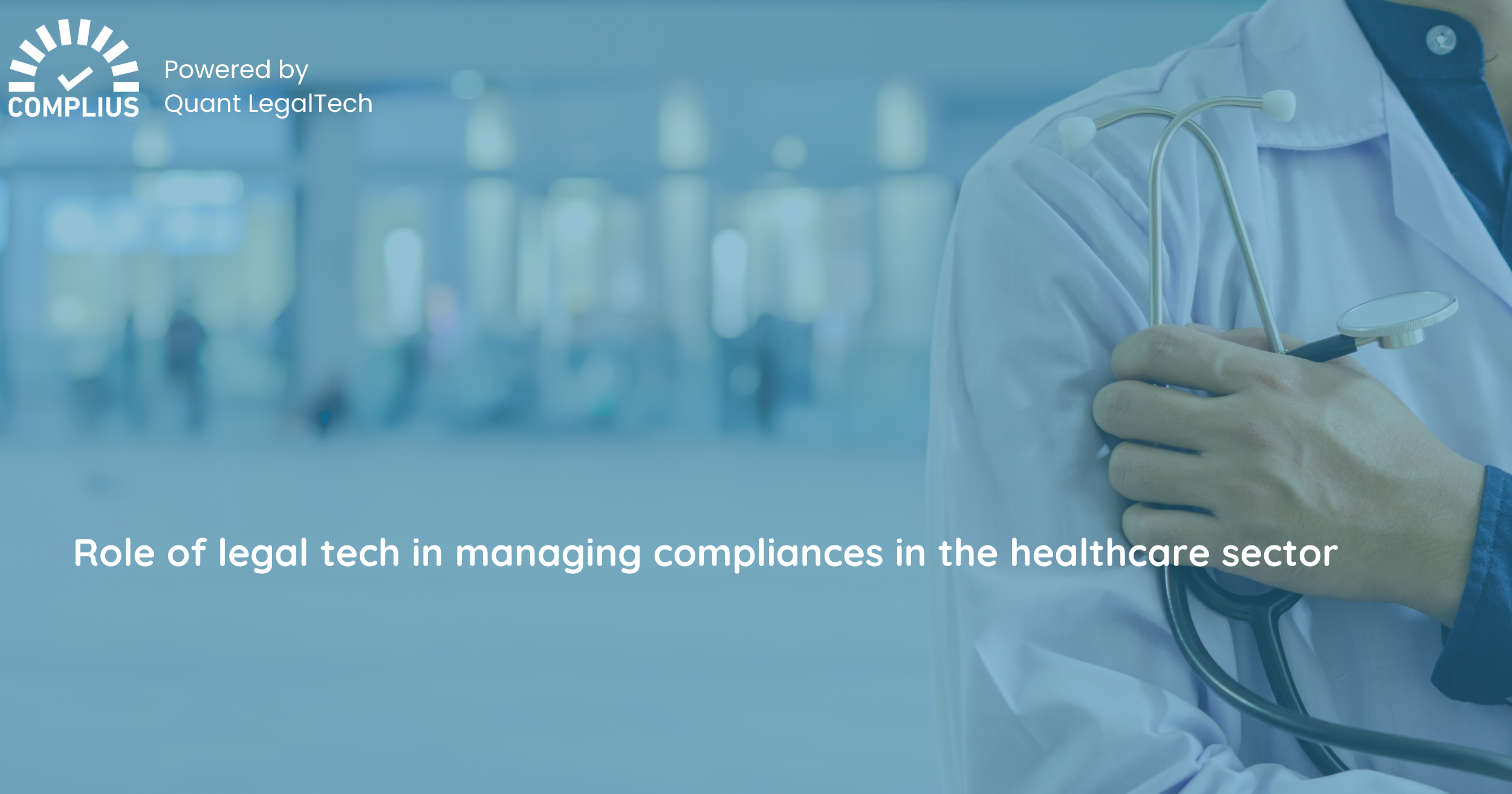Choose another country or region to see content specific to your location
Role of legal tech in managing compliances in the healthcare sector
October 17, 2023

“Healthcare” is a discrete sector and yet it covers multiple disciplines, technologies, and licensing requirements which from a compliance perspective, invokes a minefield of complexity. You only need to walk the corridors of a hospital to see this in practice; professionals with multiple certifications, controlled drugs and remedies, radiation and Xray exposure, the certifications of life and death, all wrapped in a comprehensive infrastructure of patient rights confidentiality.
Healthcare administrators face the herculean task of converting these requirements into actionable items, distributing them to appropriate owners, receiving and verifying responses and tracking and reporting outcomes. In parallel, they oversee constant iterations, audits, improvements, and data analytics designed to test and improve every facet of their operations. Finding the optimal approach to address these challenges is never easy.
Major Compliances in Healthcare
In India, The Ministry of Health, and Family Welfare acts as a watchdog for regulating the healthcare industry which regulates The Directorate General of Health Services that is a repository of technical knowledge concerning Public Health, Medical Education and Health Care.
Some of the major regulations that govern healthcare industry in India are NMC Act and the Indian Medical Council (Professional Conduct, Etiquette and Ethics) Regulations, 2002 that regulate the medical professionals in India. The manufacture and sale of drugs in India is governed under the Drugs and Cosmetics Act, 1940 (the D&C Act), along with the Drugs and Cosmetics Rules, 1945, the Pharmacy Act, 1948.
Along with the above-mentioned laws, hospitals and clinics across India are liable to be registered and obtain licenses under the following:
- Ultrasound scanning under Pre-natal Conception and Pre-natal Diagnostic Techniques Act, 1994
- Admission of Psychiatric Cases under Mental Health Act, 1987
- Selling Medicines/ Drugs under Drugs and Cosmetics Act, 1940
- Scan centers having X-RAY, CT, PET-CT etc., should get licensed under Atomic Energy Regulatory Board
- License for Blood Bank/ Blood Storage Center under Drugs and Cosmetics Act, 1940
- Besides the above licenses, clinic/ hospital will also need to get registered under and adhere to pollution control norms, fire safety norms, and other central and state-specific labor laws.
Consequences of non-compliances and role of legal tech in preventing breach
Breach of compliances in the health care industry in India can have serious implications both legally and ethically and can range from financial penalties to criminal charges, depending on the severity of the violation. Some of the key compliances include:
- Legal penalties
- License revocation
- Civil and criminal lawsuits
- Loss of accreditation
To avoid these consequences, health care organizations are making a shift towards legal technology that has significantly eased the burden of compliance activities in the healthcare industry. Through the integration of automated systems, institutions can enhance their operational procedures, gather comprehensive data, and closely monitor adherence to regulations. Artificial intelligence software are capable of detecting errors and, not only identifying them but also rectifying issues and promptly notifying the responsible parties. Consequently, not only does this make tracking activities and implementing best practices more straightforward, but it also leads to a significant streamlining of processes.
To ensure the technology is at par, it’s crucial to upgrade to a solution that provides top-notch security and accessibility.
Some ways through which compliance activities can be eased in the healthcare industry-
- Automated Compliance Monitoring: Legal tech solutions offer automated tools for monitoring regulatory changes. These platforms can track updates in laws and regulations at both central and state levels, ensuring that healthcare organizations stay up to date with the latest compliance requirements and licenses.
- Efficient Documentation: Legal tech tools streamline the process of documentation and record-keeping, making it easier for healthcare professionals to maintain compliance records, track patient data access, and demonstrate compliance to regulatory authorities.
- Data Analytics: Advanced analytics offered by legal tech can help to identify compliance issues, patterns of non-compliance, and areas requiring improvement. This data-driven approach allows healthcare organizations to proactively address compliance challenges.
- Training and Education: Legal tech platforms often include training modules and resources to keep healthcare staff informed about compliance requirements. This is especially valuable as compliance education is an ongoing process.
- Risk Assessment: Legal tech can assess potential risks and vulnerabilities within healthcare organizations, helping them prioritize compliance efforts and allocate resources effectively. Example- Complius
- Workflow Integration: Legal tech solutions can integrate with existing healthcare management systems, making it seamless for organizations to incorporate compliance into their daily operations.
How Quant LegalTech’s Complius® helps you manage your healthcare compliances
Quant LegalTech’s compliance management tool Complius® serves as the solution for meeting all the compliance requirements in the healthcare sector. By aiding the hospitals and clinics in keeping track of their licenses and compliance tasks, it safeguards them from incurring large penalties and legal ramifications. One of the standout features of the tool is the comprehensive license report that helps the clients to keep a track of their past, present and upcoming license in accordance with the healthcare regulations and facilitates the management of expired or upcoming licenses.
Moreover, Complius® has been instrumental in assisting a major hospital client in India with the management of its compliances and licenses across multiple locations in the country. Through regular monitoring of their compliance, and establishment of a license repository, the tool has significantly streamlined the client’s operational processes.
Conclusion
In healthcare, adherence to regulations is not optional; it’s mandatory. Neglecting legal and ethical responsibilities can lead to significant repercussions. Thankfully, legal technology is reshaping the healthcare compliance scenario. Through process automation, improved documentation, and insightful data, legal tech solutions can become more efficient and effective in compliance management. As technology continues to progress, there can be further innovative solutions that will simplify compliance in healthcare, ultimately benefiting both healthcare providers and the patients under their care.